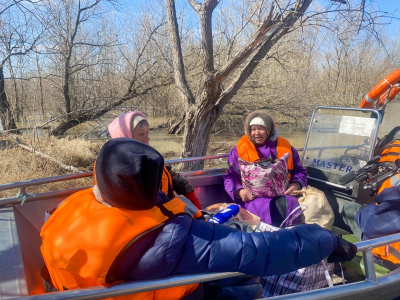Tokayev’s latest speech shows that patriarchal rhetoric is an integral part of authoritarian regimes.
Читайте этот материал на русском.
At one point during his latest Address to the Nation in early September, Kazakhstan’s President Kassym-Jomart Tokayev went after an unexpected target, women’s public behavior, expressing his “particular displeasure” in seeing women “causing scandals, using obscene language, and committing indecent acts in public”.
“Such actions are unacceptable in a cultured, civilized society; they damage our country’s international image,” Tokayev said.
Tokayev’s words sparked a storm of criticism on social media and marked a rare instance where the Presidential Administration was forced to defend itself in public. The problem, according to Tokayev’s critics, was not only the language he used to berate women, but the broader significance of his message.
Tokayev’s comments exemplified the persistence of clearly misogynistic views towards women in Kazakhstan’s political discourse, an issue that, far beyond any one politician’s speech, is ultimately tied to a patriarchal logic central to authoritarian governance.
Anti-Women Rhetoric
Traditionally, women’s issues are a marginal topic in Kazakhstan’s political discourse. Top government officials most often address them during celebrations for International Women’s Day and Mother’s Day, as well as when discussing fertility and demographic issues.
In official rhetoric, women are typically portrayed as weak and inactive participants in politics. A striking example of this came in an address by Tokayev last March, when, celebrating International Women’s Day, he called them “the source of beauty, tenderness, and care,” “mothers, keepers of the hearth,” and “the soul of the nation, preserving national traditions and our native language.”
As Tokayev continued, it became apparent that he saw the state’s duty as safeguarding women’s rights, rather than empowering women themselves to claim greater political participation.
“The state will always pay special attention to protecting women’s rights and creating conditions for the full self-realization of all citizens. I am confident that women’s commitment, responsibility, and creative energy will become a powerful driving force behind the large-scale reforms being carried out in the country,” Tokayev said.

The current president seems to have largely inherited his predecessor’s disparaging rhetoric.
While in office, former President Nursultan Nazarbayev constantly used stereotypical images of women and even resorted to inappropriate jokes: “A schoolboy is reading a book on ‘Myths of Ancient Greece’ and asks his father, ‘Dad, why did the ancient Greeks always depict victory as a woman?’ His father replies, ‘When you get married, you’ll find out.’”
Nazarbayev’s prejudices about women became part of political culture: society perceived these statements as “normal” because they were voiced by the former president.
Since Tokayev took office in 2019, society has noticeably changed its views on the topic.
This year, people’s reaction to the president’s patriarchal statements during his September address was so loud that his administration had to clarify his wording.
Unfortunately, the explanation of the president’s initial wording regarding “scandalous women,” ended up even more patriarchal than the original version.
“The head of state noted that, ‘Unfortunately, women are also among those [who violate public order].’ Some perceived this as a reproach, but the meaning is quite different. After all, if women–who have historically embodied beauty, fragility, and harmony–have started to get involved in scandals, then the crisis in cultural behavior has truly become serious,” the Presidential Administration wrote in a statement.
The phrase about “women causing scandals” was uttered in the Kazakh-language portion of the president’s speech. The official Russian translation, published later, redacted this portion of the text.

Sociologist Kamila Kovyazina notes that derogatory rhetoric toward women in Kazakhstan has been normalized to such an extent that it is no longer perceived as offensive or inappropriate.
“That’s why no one tells anyone that they can’t use such a tone, especially not the president. Plus, if nobody denounces you for what you say, you may even think that your words cannot offend anyone,” Kovyazina told Vlast.
Political scientist and human rights activist Kassiyet Temirzakhkyzy argued that the patriarchal rhetoric stems from the popularity of the idea of a “strongman,” whereby a “manly leader” decides for everyone.
“Tokayev’s rhetoric about ‘law and order’ is built around the idea of a strong leader, which leaves women and other vulnerable groups outside the decision-making process,” Temirzakhkyzy told Vlast.

Reactionary Laws
In their explanation of Tokayev’s statement, the Presidential Administration also recalled his legislative initiatives, arguing that he “treats women with genuine care and attention, not just in words, but in deeds.”
The Presidential Administration listed a number of proposals: from a gender quota on party lists during elections to the abolition of employment discrimination against women; from the extension of child care benefits to the recent law on domestic violence.
Experts however believe that the government’s push for legislative changes only comes after high-profile incidents. And, although these laws are presented by the authorities as definitive answers, in reality, their impact remains limited.
This is best illustrated by the law on domestic violence, adopted after former minister of economy Kuandyk Bishimbayev murdered his wife, Saltanat Nukenova. The international resonance of the trial against Bishimbayev was a key factor in speeding up the legislative process.
Temirzakhkyzy pointed out the duality of laws aimed at protecting women. On the one hand, they improve Kazakhstan’s international image and satisfy the long-standing demands of society; but on the other hand, “traditional values” are still woven into these documents.
“These ‘progressive’ initiatives continue to focus on the institution of the traditional family, demonstrating that the state is simultaneously trying to please society and preserve its own patriarchal narratives,” Temirzakhkyzy said.
According to human rights activist Aigerim Kussaiynkyzy, expanding women’s rights is a way for a political regime to appear modern. But such steps do not change the foundations of power.
“It’s classic autocratic genderwashing: it’s for self-preservation that the system offers women limited benefits in exchange for loyalty,” Kussaiynkyzy told Vlast.

“When a ‘law protecting women’ appears in the news, society often breathes a sigh of relief. But law isn’t magic. It’s infrastructure. And it only works when the norm becomes a procedure, the procedure becomes a budget, and the budget becomes accountability. Everything else is window dressing,” Kussaiynkyzy added.
Mandatory quotas for women on party lists, introduced in May 2020, were expected to improve the gender balance in politics. The quota of 30%, however, is shared with young people and with people with disabilities. As a result, the share of women deputies shrank by almost 10% between 2021-2024.
Staff at the Presidential Administration follows a similar trend. Last month, Tokayev terminated the tenure of a number of assistants and advisers: among them, Tamara Duisenova (assistant), Kunsulu Zakarya (adviser), and Zulfiya Suleimenova (adviser) were fired. Now, the Administration only employs one woman among senior officials, adviser Assel Zhanasova.
There are 47,158 women (55.8% of the total) in civil service, but the number of female managers in various structures is 9,363 (39.1%). In local assemblies, women account for 22.7% (774 out of 3,415), and only 15.4% of the members of the current cabinet are women (4 out of 25).
Thus, according to Temirzakhkyzy, the adoption of quotas has not led to real progress.
“We still don’t have women among regional governors and city mayors [only once, since independence, a woman held the post of regional governor – V.]. Recently, they added one female minister, but compared to the total number of ministers, that’s negligible,” Temirzakhkyzy said.

Can There Be a Non-Patriarchal Politics in Kazakhstan?
According to Kussaiynkyzy the predominance of men in the country’s leadership shapes the political discourse through a “male lens.” Plus, this patriarchal logic thrives among Kazakhstan’s society which still clings to stereotypes about women.
“Therefore, it’s easier for politicians to parrot conservative tropes, and that’s how we get phrases like ‘our women should do this’ or ‘they don’t watch their language,’” Kussaiynkyzy said.
Kussaiynkyzy added that during periods of political or economic turbulence, authorities use women’s bodies and the issue of women’s role in society as a tool for mobilization: it’s easier to demand that they “have more children” or “help preserve traditions” than to discuss rising prices or corruption.

Social demand for equality is growing and new generations no longer find distracting tactics convincing, the activist argued.
“The social threshold of tolerance has lowered: sexism is no longer perceived as a ‘joke’ or ‘traditional wisdom,’ but as a violation of rights and a denigration of dignity,” Kussaiynkyzy said.
Temirzakhkyzy agreed: “[After the murder of Saltanat Nukenova], many women began to say that the problem of violence is not a private matter, but a systemic problem that must be addressed at the state level.”
According to Temirzakhkyzy, Kazakhstan’s political regime could only cease to be patriarchal if institutions are democratized and real reforms are implemented. The feminist community in Kazakhstan is already demanding change: from freedom of peaceful assembly to increasing the number of women in positions of power.
Gender equality requires autonomy and accountability in government, argued Kussaiynkyzy.
"An indicator of real reform is the presence of strong and independent women’s organizations. If space for them is closed, equality remains only in words,” Kussaiynkyzy said.
This is an edited translation, shortened and slightly amended for clarity.
Sign up for our English-language newsletter.
Власть — это независимое медиа в Казахстане.
Поддержите журналистику, которой доверяют.
Мы верим, что справедливое общество невозможно построить без независимой журналистики и достоверной информации. Наша редакция работает над тем чтобы правда была доступна для наших читателей на фоне большой волны фейков, манипуляций и пропаганды. Поддержите Власть.
Поддержать Власть








